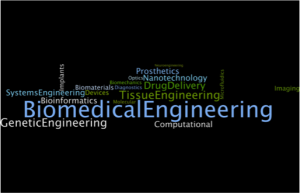 As I think back to when I was applying to colleges (nearly 10 years ago...wow!) and began to think seriously about my career plans, I remember scrolling through web pages that described all of the different majors a student could enroll in. After scanning through several of these "major search engines", Biomedical Engineering (BME) stuck out. When I read the descriptions, the biomedical engineering field promised involvement in cutting-edge research and development of products that would revolutionize healthcare and quality of life for diseased individuals. These prospects excited me! BME seemed like the perfect fit since I had always been fascinated by biology, while math and other physical sciences were my strong suits.
As I think back to when I was applying to colleges (nearly 10 years ago...wow!) and began to think seriously about my career plans, I remember scrolling through web pages that described all of the different majors a student could enroll in. After scanning through several of these "major search engines", Biomedical Engineering (BME) stuck out. When I read the descriptions, the biomedical engineering field promised involvement in cutting-edge research and development of products that would revolutionize healthcare and quality of life for diseased individuals. These prospects excited me! BME seemed like the perfect fit since I had always been fascinated by biology, while math and other physical sciences were my strong suits.
In pursuit of this degree, I took a wide array of science, engineering, and biology classes. During a mechanical engineering class, I learned about stresses applied to beams and trusses. In a material sciences class, I learned about crack propagation and elastic/plastic deformation. In cell biology, I learned about cellular respiration, DNA replication, and apoptosis. Therefore, I had to quickly learn a lot of different concepts from several different fields and at times blending all of this knowledge together was a challenge. While the bioengineering courses that I took somewhat addressed this, there were still several missing links. After 4 years of BME courses, independent research, and an engineering capstone project, I still didn’t think that I had a firm grasp on what BME was.
This  void left me wanting more knowledge. So, off I went to graduate school. Surely after getting a Ph.D. in Biomedical Engineering I would feel like an expert, ready to take on any biomedical challenge with ease...right?!
void left me wanting more knowledge. So, off I went to graduate school. Surely after getting a Ph.D. in Biomedical Engineering I would feel like an expert, ready to take on any biomedical challenge with ease...right?!
What I didn't expect was that my already broad view of BME would become even more so. Through graduate classes and department seminars, I came to learn that BME also encompasses tissue engineering, nanotechnology, robotics, drug delivery, regenerative medicine, medical imaging, systems engineering, biomaterials, and more. These seminars expanded my breadth in BME, while my own research enhanced my depth. Nevertheless, in such a broad field, I sometimes can't help but feel like a jack of all trades and a master of none. I mean, even stating that I am a "Biomedical Engineer" barely specifies what I work on and can actually mean a number of things in terms of technical expertise.
Despite this, what I have truly come to appreciate from my graduate training in BME is that I have learned how to be a manager of a project with a clinically-relevant need. When interacting with graduate students with biology backgrounds, I have realized that many of those students struggle to identify the clinical relevance or translation of their work, whereas BME students do not. The challenges that we are working on are real-world problems that affect actual people with life-threatening diseases and conditions. Our work pushes towards finding a solution to a clinical problem, with a direct path in sight (well, as direct that you can hope for in biological research, that is).
While I have come to terms with the notion that I will never truly be an expert in the ever-growing and broadening field of Biomedical Engineering, I have also come to appreciate that there is always room to learn and grow. Being exposed to different aspects of BME has forced me to become comfortable with being flexible. Biotechnologies will always be changing. In response, unmet clinical needs will shift and our tasks as BMEs will be redirected accordingly. BMEs, at times, may feel like jacks of all trades and masters of none, but where their value truly comes in is with their library of knowledge that can be expanded upon when needed.
After nearly 5 years of graduate school and 4 years of undergraduate studies, I have finally defined what Biomedical Engineering means to me. BMEs do not cower in the face of intellectual challenge. We adjust and learn. We manage projects. We find those with the technical expertise that we need in order to get a task done.
We do this, because we are biomedical engineers .